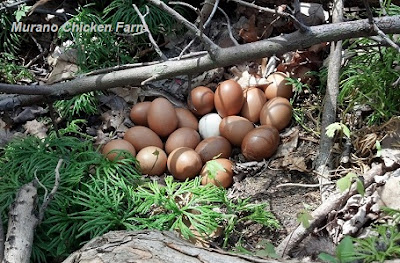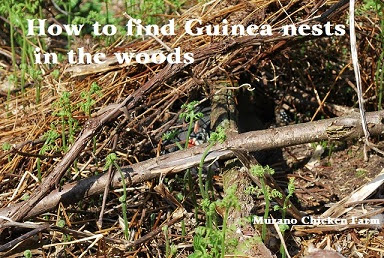If you don't find the nest, inevitably the Guinea hen will decide to hatch the eggs. Guineas sit on the nest for 28 days. In this time they are out there for all the predators to find. Many Guinea hens don't survive the setting period because of predators. If you're lucky the predator will only be after the eggs and the hen will run off. If not...well...
Those are pictures of Guinea nests I've found over the years to kind of help you see what to look for as you hunt Guinea nests of your own. As you can see, I placed a trail cam on one when they were in the coop for the night.
You gotta be pretty slick because if there is one thing they're good at, it's keeping a nest hidden! The nest in the next picture was started by a guinea but taken over by a chicken (it was pretty close to her coop)
Guineas start laying eggs every spring around April in my area. They may start earlier in warmer areas though. I keep track of when I find the first guinea eggs every year so I know when to expect them to start laying again the next year.
How to Find Guinea Nests
1. Follow the Guineas to see where they hang out, but don't spook them. It might help if you have some scratch in your pocket to throw to the 'guard' guineas while the hen is on the nest.
2. The hen will sometimes sing to the 'guards'. It's a quiet but high pitched sing-song type of call. Almost like a trill. This can help you to pinpoint where she's setting.
3. The 'guards' will probably scream their heads off at you the first few times they see you. The'll get used to you the more you visit while they're doing their thing. Expect some straight up 'sound the alarm' screaming at first though.
4. For dumb birds they are pretty smart about warning the laying Guinea when you're near. It's almost like a game of hot-n-cold. The hotter you are, the more they scream.
5. You're probably very hot if they suddenly take off in the other direction. A great diversion tactic, "follow me!" they seem to say as they run away from the laying hen.
6. Don't look directly at the laying hen! Funny isn't it? They can't know that you know where they are.
7. Come back later and find the actual nest.
After you find the guinea hen nest
8. Steal most of the eggs. Mark the ones you leave. If you take them all, she will find a new spot and the game starts over. If a predator gets the nest, the game starts over. You do not want this game to start over!
9. When a hen is missing (especially at night) check the nest. You might have to take her off the nest and back to the coop. To break the broody or not to break the broody is up to you. I find they stink as mamas and would rather break the broodiness....unless they try to hatch eggs in the coop. Then I usually let them.
10. Picking up a setting hen might require gloves but it is nowhere near the blood bath most stories I've read indicate. Seriously...it's like giving birth, everyone has a horror story but it's often just a simple procedure. Pick her up making sure you hold her legs and tuck her wings in, carry her to the coop and put her in. (I do the football hold with the opposite hand holding her legs)
11. When you try to find a nest look in: piles of brush, downed trees, high grasses and ferns (usually after a few days they will have worn down the grass like a foot path...follow the path) piles of branches, under pine trees, under bushes.
12. Also check: under the coop/barn, behind the log pile, behind the garage, behind the fence, in rarely used kids playhouses, under the tractor, under overturned wheelbarrows and such. Anywhere they have protection on at least one side that nobody really messes with often.
Guinea eggs are quite tasty so if you don't have any plans to incubate them, you might want to try these:
Guinea fowl egg and asparagus salad or,
Guinea egg pound cake.
These tips should help you get started with your nest finding. It's a yearly event here but many people would prefer not to have to hunt for nests, which makes this one of the main reasons not to raise guineas. Happy nest hunting!
~L
Want information on raising chickens sent right to your email weekly? Click right here to join my list and get new posts sent directly to you the day they're published. You'll also get the free download 25 Ways to save money raising chickens.




guineafowls are super nest hiders in that aspect. but our guineas seemed to be less in that, they lay their eggs in the coop just like our chickens or mybe its because those little budies were raised by our oldest hen in the flock, chicken hen lay their eggs in my bedrood under my school box carboard. i' never thought that guineas can lay inside a house,they forange all day long never cooped,foranging with our chickens all all the time.one of the pearl hens was running around the yard,scratching depression all over where she enter,she entered in the front kitchen door straight under my bed, later i' went to check the was an egg, she continued to lay until she went broody, and she was a very tame girl who allowed anyone to touch her,even moving her to eat,and will comeback withought abaondoning. thanks for the nest tips,we will have to hunt to our new lazy hens who don't want to lay in the coop. funny birds
ReplyDeleteI have some super tame guineas and others that are wilder. Usually the ones I let a Silkie hen raise turn out the tamest. They usually lay in the coop too. They are funny birds, aren't they?
Delete~L
My guinea fowl is in the long grass in the vegetable garden. The babies should hatch any day. What kind of 'home' should I create for them, as they can't stay in the veg. garden because of predators. The mature g/f sleep up in the trees. But when will the babies be able to fly and how can I look after them till then? Thanks. CC Australia
ReplyDeletei have one guinea i think is a female going by her call, my daughter says she shouts enough, enough, enough when there is a skuffle in the shed. she is an only hatch from the 2nd set of eggs incubated, she has been raised with chickens right from hatch day and still roosts with them each night, i got 1 from an earlier hatch i think was a boy, but sadly he hurt his hip in the incubator although i thought i had it rectified his leg became totally missshapen and was moved to live with the quail and lived with them for around 6 months but recently died. so i am left with a loan guinea, who is living with around 60 hens (4 of them are her brooder gang) 7 ducks 2 geese and 3 turkeys in a large stone built shed. they have free range to 3/4 acre all day and are closed in at night. as i have such a variety of birds i want to ensure i am catering for all their needs,so i would like some advise on a few points, 1. i am concidering getting her a mate i feel she walk around finding she is speaking a different language from her brooder gang, and i would like to hatch eggs if and when she lays, should i wait until she begins to lay i persume it will be similar to chickens as in the first eggs will be smaller and grow in size, or get the guy now, i have been offered an 8 year old hand reared male, and will any male do or are they a little like geese and want to choose and mate for life? 2. nesting, i want to encorage her to lay indoors, i have a Kennel in the shed that the geese have taken over, there is around 36 raised nest boxes around 1 foot square and are in 2 rows of 16ish one above the other. and in the bottom corner of the shed i rigged up a shelter for the ducks, stone wall on 2 sides wooden pallet roof and 3rd wall and open front. the floor is covered with straw and i put in a cut of barrel top again filled with a mix of straw and wood shavings. the ducks have totally dissed this but the last 2 days i have found guinea (that's her name the other one was called keet) just sitting in the barrel but no egg has been left. is she just having a rest or is she preparing to lay? and if she does would i be right to just leave her eggs alone? and would it be better to have a more closed front? and should i remove any other birds eggs from the nest. i always check the nest of my birds when they are out for the day so would do this with guinea. sorry for all the questions first guineas and i want to get it right
ReplyDeleteMy hen layed in the garden and she is sitting on her eggs now. I just pray that she will not be noticed by any scavenger. Thanks for the great information.
ReplyDeleteOhhh, good luck! I hope she hatches out a bunch of keets for you!
DeleteLisa